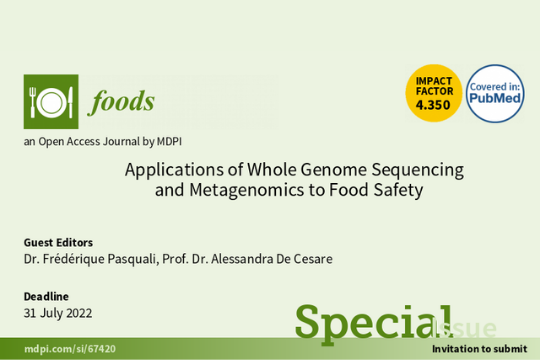Guest Editors
Frédérique Pasquali - frederique.pasquali@unibo.it
Alessandra De Cesare - alessandra.decesare@unibo.it
Special issue information
In recent years, next generation sequencing has opened unprecedent opportunities. In food safety, whole genome sequencing (WGS) and metagenomics have been successfully applied to trace back the source of contamination, investigate reservoirs of foodborne pathogens, assess the likelihood and magnitude of a food safety hazard to cause illness; study the effect of intervention strategies on the microbiome, virulome and resistome of a particular animal or food microbiota; and, predict the likelihood of pathogen/gene transfer. WGS has the advantage of fine tuning the focus from the species/genus level to subtypes associated to a higher risk of infection or disease in humans. Metagenomics has the advantage of studying not only a narrow number of bacterial populations but the entire microbiome of a specific animal, food, or environment. However, these methods bring specific challenges: 1) they investigate genotypes which are not always reliable for phenotype predictions; 2) their implementation is challenged by lack of standards in the wet lab aspects and a wide variety of available platforms and bioinformatic pipelines.
This Special Issue deals with all applications of whole genome sequencing and metagenomics to food safety including but not limited to trace back sources of environmental contamination, outbreak investigation, source attribution, microbial risk assessment, antimicrobial resistance and virulence characterisation, evaluation of the effect of intervention strategies on microbiota in the farm to fork chain. The full range of microbial foodborne pathogens are expected to be assessed from bacteria to parasites, fungi, and viruses.
Keywords
• Whole genome sequencing
• Metagenomics
• Outbreak investigation
• Source attribution
• Microbial risk assessment
• Microbial food-borne pathogens
• Antimicrobial resistance
• Virulence
• Farm-to-fork chains
• Intervention strategies
Manuscripts should be submitted online at www.mdpi.com by registering and logging in to this website. Once you are registered, click here to go to the submission form. Manuscripts can be submitted until the deadline. All submissions that pass pre-check are peer-reviewed. Accepted papers will be published continuously in the journal (as soon as accepted) and will be listed together on the special issue website. Research articles, review articles as well as short communications are invited. For planned papers, a title and short abstract (about 100 words) can be sent to the Editorial Office for announcement on this website.
Please visit the Instructions for Authors page before submitting a manuscript.

